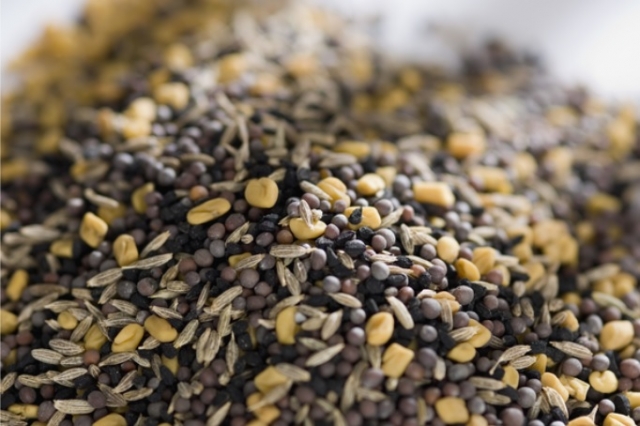Some of the most popular cumin substitutes; are the chili powder, caraway seeds, curry powder, garam masala, coriander, chipotle paprika, or even taco seasoning mixture, depending on the dish you are cooking. These spices and herbs have not only similar flavor components, but they also offer some interesting health benefits.
Cumin is a spice that many people associate with Mexican food, but the whole world uses it, especially in Indian and Asian cuisines. It comes from a flowering plant, and the oblong and striated seeds can be used in whole or ground form. The flavor of cumin can is as nutty, spicy, and earthy, but there is also a slightly bitter aftertaste, and even a citrus tone at the same time. This taste profile accompanied a high level of iron, magnesium and calcium, antioxidants, volatile organic compounds, and smaller amounts of dietary fiber. This precious spice can help digestion, reduce inflammation, help with respiratory disorders, boost immunity, prevent chronic diseases, and speed up the healing process, especially on the skin.
What if you find yourself halfway through the preparation of your favorite recipe and realize that you don’t have this delicious spice. Fortunately, there are suitable cumin substitutes. Keep reading and find them out.
1. Benefits of cumin
Before talking about the cumin substitutes, it’s important to remember some of the cumin benefits on the body.
In brief, cumin is analgesic, anti-inflammatory, antispasmodic, and antipyretic. You can use cumin to relieve difficult digestion, stomach pain and spasms, and menstrual pain, gastritis, rheumatic inflammation, hepatitis, and fevers.
1.1 Digestive disorders
Cumin is an important spice that prevents and relieves most digestive problems and reduces food-borne infections. We recommend its consumption in case of difficult digestion, flatulence, colic, diarrhea, constipation, abdominal, and stomach pain.
1.2 Anti-cholesterol
Many studies have shown the anti-cholesterol properties of cumin. Each time, the group taking cumin saw an improvement in cholesterol compared to the group taking a placebo.
1.3 Antispasmodic and anti-inflammatory
It is the ally of tonic digestion. It stimulates appetite, prevents bloating, colitis, infections, and constipation, and promotes sleep. Endowed with hormone-mimetic properties, it promotes the onset of menstruation and lactation. Antioxidant, by its beta-carotene content, it fights against cellular aging.
1.4 Anti-anemia
A teaspoon of cumin powder contains an average of 1.4 mg of iron, which corresponds to more than 17.5 % of the recommended daily intake for iron for an adult.
2. Cumin substitutes
2.1. Cumin substitutes; Chili powder
Since cumin is present in Mexican foods and provides a good spice boost, it's not surprising that chili powder is a popular substitute. This spice is also one of the main ingredients in chili powder. However, remember that chili powder also contains paprika, cayenne pepper, and garlic powder, so there is a lot of heat in this substitute. Use about half of the chili powder as much as you would use cumin to burn your mouth. Chili powder is also goo to aid digestion and soothe inflammation throughout the body.
2.2 Cumin substitutes; Caraway seeds
Cumin and caraway are both from the parsley family. They are similar in their appearance and taste, although cumin has a stronger, warmer flavor. Use caraway seeds in place of cumin seeds or ground caraway in place of ground cumin. Start with half of the recipe and adjust it up according to your taste.
2.3. Cumin substitutes; ground coriander
Cumin and coriander grow from the same plant in parsley, or Apiaceae family. You can use both of them to season dishes in Latin, Middle Eastern, and Indian cuisines.
The stems and leaves of fresh coriander are called coriander. The dried seeds are used whole or ground into a powder for cooking.
Coriander and cumin give a lemony, earthy flavor, to dishes, although coriander is sweeter in heat.
2.4. Cumin substitutes; Taco Seasoning Mix
One of the cumin substitutes and which may not be considered gourmet haute cuisine is to use a taco seasoning mix, but the mix of spices, including cumin, provides the perfect balance of spice and heat. If you run out of pure spices, or just want to make the flavor a little more complex and pleasant, replace the recommended cumin with taco seasoning mix and enjoy your next meal with a little of Mexican inspiration.
2.5. Cumin substitutes; Curry powder
Curry powder mixes usually contain cumin, which makes it one of the excellent black cumin substitutes. Like the other spice mixes mentioned above, it also brings other flavors to the mix.
The composition of curry powders varies. In addition to cumin, they usually include around 20 herbs and ground spices, such as ground ginger, turmeric, cardamom, coriander, fenugreek, black pepper, and cinnamon.
Combined, these spices give a warm and aromatic blend with a deep yellow tone.
Curry is an ideal substitute in dishes from Southeast Asia. Keep in mind that this will give your dish a striking yellow color of turmeric.
2.6. Cumin substitutes; Garam Masala
This mixture of Indian spices includes a good dose of cumin. It usually includes coriander, cardamom, black pepper, cinnamon, cloves, and nutmeg, creating a complex flavor that is earthy, sweet, lemony, and spicy. The color is very similar to that of cumin, so it will not significantly change your recipe's appearance.
2.7. Cumin substitutes; Paprika
Paprika is a potent spice commonly found in Asian and Mexican cuisines and is highly sought after because of the smoke flavor it provides to many different foods. Cumin has a limited smoked quality in terms of flavor, but when you substitute it for paprika, it can fool almost anyone. However, paprika is very potent, so start at 25-50 % of the recommended amount and continue from there.
2.8. Cumin substitutes; fennel seeds
As a member of the parsley family, fennel seeds are also a good alternative to cumin.
Fennel seeds have a licorice flavor similar to that of anise, which cumin doesn't contain. It won't produce the same nuances of smoke and earth, but fennel seeds won't taste bad when you're on edge.
Use ground fennel to replace ground cumin and fennel seeds to replace cumin seeds.
As with the other cumin substitutes discussed here, start slowly with about half the amount of cumin required by the recipe. Then add the pinches of spices at a time.
If you miss the smoky flavor, consider adding a pinch of paprika to your dish.
Cumin is an earthy and aromatic spice that brings citrus notes to a recipe.
If you're in a pinch, there are many great alternatives you might already have in your pantry.
Caraway seeds and ground coriander best imitate the flavor of cumin, while curry and chili powders already contain cumin in their blends.
In case of a lack of cumin, rest assured that your recipe will always taste fantastic thanks to these cumin substitutes.






